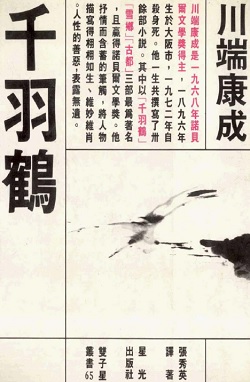Chapter 1 translator's words
translator's words
This year's Nobel Prize in Literature was awarded to the Japanese novelist Yasunari Kawabata. In the award review, he said: Mr. Kawabata expressed the characteristics of Japanese psychology in his delicate and refined works with a highly sensitive technique.
He is one of the writers who rose up in the early 1900s. His works are mostly elegant, noble and aristocratic writers. In the Japanese literary world, he is considered the most authentic traditionalist.
This time, the Swedish Academy of Literature decided to award this award to Yasunari Kawabata based on the review of the three novels of the Snow Country Thousand Feather Crane Ancient Capital.
Kawabata Yasunari's other works include Odoriko of Izu, People Who Love, Hundred Chapters of Novels, Dance Girl, Asakusa Sisters, Yamano, Words from Kawashita Town, People in Tokyo, Women's Things, Rainbow Boat Travel, Sea Water, Celebrities, Sleeping Beauty and many more.
This thousand-feathered cranes is based on a part of the tea ceremony in Japanese life, and uses delicate writing, extremely cautious and concise plots, and expresses a strong sense of Japanese tradition.His writing skills have not been influenced by western literary trends.As such, he is considered an innovator of traditionalism in Japanese literature.
This book reflects the psychology of the Japanese people with various plots of tea ceremony and tea sets, and then symbolically describes the profound meaning of the story.
In order to translate this book, I was afraid of translating a famous work of world literature into a work that did not convey the meaning. I consulted many older scholars and Japanese writers, and consulted many Japanese reference books before completing it.Because of time constraints, it is inevitable that there are some things that cannot be satisfactory, but I have tried my best to be faithful to the original.
Yasunari Kawabata was born in 1-chome 79, Tenmanzohana-cho, Osaka City, in the thirty-second year of Meiji (1899).Father Rongji, a doctor by profession, can compose Chinese poems and draw stories, and is a very funny person.Kang Cheng lost his father at the age of one and his mother at the age of two, and was raised by his grandparents.At the age of seven, my grandmother died again, and since then I have lived with my grandfather.When he was ten years old, after his parents died, Yoshiko, the only older sister who lived in his grandfather's house, also died.In the summer of the third year of Taisho, when he was fifteen, his grandfather died again.Since then, he has become an orphan completely alone.
In the sixth year of Taisho (1917), he graduated from Ibaraki Middle School in Osaka Prefecture. In September, he was admitted to Tokyo High School Part One B (English Department).In the ninth year of Taisho, he graduated from a high school and entered the English Department of the Faculty of Letters, Tokyo Imperial University (English Department of the Faculty of Letters).
This year, I got to know Ju Chi Kuan, and was appreciated by Ju Chi, and from now on, I got a lot of help from him.Since then, he has officially helped the literary world.In the thirteenth year of Taisho (1924, at the age of twenty-five), he graduated from Tokyo Imperial University.
In the fifteenth year of Taisho (that is, the first year of Showa, 1922 in the Western calendar), the draft of Izu's Odoriko was completed.In the tenth year of the Showa era (1935), I began to write Snow Country.In January, Mirror of Evening Scenery (one of Snow Country) was published in Bungeishunju, its sequel White Morning Mirror was published in Renovation, Monogatari and Futility were published in Japan Review.
In the following year, Chengxuan's flower was published in the Central Committee, and in October, the fire pillow was published in Wenyi Chunqiu.In the twelfth year of the Showa era, hand-made songs were republished.Fifteen years later, "Fire in the Snow" was published in public opinion.
In the 21st year, the copy of Xueguo was published on Xiaozhong, and in the 22nd year, the continuation of Xueguo was published in the novel Xinchao
.So far, Snow Country has been completed.In September of that year, Bungeishunju Society established the Akutagawa Award and the Ueki Award, and was elected as a selection committee member for the Akutagawa Award.In the twenty-fourth year of Showa (1949, fifty years old), Qianyuhe was completed.
In the 28th year of Showa (1953), he was elected as a member of the Art Academy.In the 43rd year of Showa (1968), at the age of 68, after Rabindranath Tagore, he was the second winner of the Asian Nobel Prize for Literature.
Translated in Taipei City on November 14, 1968

